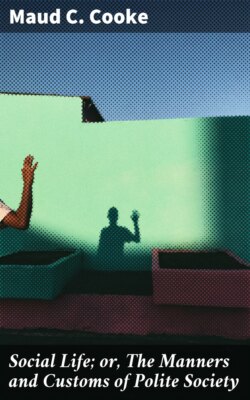Читать книгу Social Life; or, The Manners and Customs of Polite Society - Maud C. Cooke - Страница 49
На сайте Литреса книга снята с продажи.
Engraving the Name.
ОглавлениеTable of Contents
Married ladies make a point of using their husband's name or initials upon their cards instead of their own, as:
Mrs. George B. Cleveland,
Or:
Mrs. G.B. Cleveland,
Instead of:
Mrs. Grace E. Cleveland.
It occasionally, however, happens that some lady, unwilling to so lose the identity of her own name, prefers this latter form. Or, if her family name be an old and honored one, she frequently retains it, thus:
Mrs. Grace Ethridge Cleveland.
But, though the married woman make use of her husband's name, she has no claim to his titles; so that while others may address her as "Mrs. Judge So and So," "Mrs. Dr. So and So," she must carefully avoid all such display. Let her be comforted, however, as her just pride in her husband's honors is easily gratified, since she is expected, on all formal occasions, to leave one of his cards, wherein his titles are set forth, with her own.
Occasionally a lady contents herself with having engraved upon her cards a simple:
Mrs. Courthope.
This, however, is unwise unless the name is a very uncommon one, and even then, should there be more than one branch of the family in the vicinity, the wife of the oldest member of the family only would have a right to make use of it.
Newly married couples frequently send out for their first cards the largest size mentioned engraved thus:
Mr. and Mrs. Holman B. Hunt.
Occasionally they preserve this custom throughout the entire first season. But this is all; from thenceforth husband and wife have their own separate cards. They may, however, be used at times throughout the married life to convey messages of sympathy, congratulation, or to accompany gifts.
Widows have always hesitated about exchanging the beloved and accustomed name upon their cards for their own signature. This, however, in many cases, is a necessity, especially where there is a son bearing the father's name. This is sometimes thought to be avoided by the use of the distinctive "Senior" or "Junior," a custom obviously wrong, since after the death of Francis Brown, Senior, Francis Brown, Junior, becomes at once Francis Brown, and his wife, Mrs. Francis Brown. Hence, while we have no such convenient title as "Dowager," the widowed Mrs. Francis Brown will be obliged to drop her husband's name in favor of her son's wife and thenceforth appear before the world as Mrs. Mary E. Brown. Where there are no children, or immediate relatives, change of title on the part of the widow is a mere matter of sentiment.
The black border upon a widow's cards should never be over a quarter of an inch in depth: more than this savors of ostentation rather than affliction.
Young ladies, especially if it is their first season in society, will find it the best form to have their names engraved upon the visiting card of their mother. Thus, if it is the eldest daughter:
Mrs. Wilfrid Ferguson.
Miss Ferguson.
If a younger daughter:
Mrs. Wilfrid Furguson.
Miss Ethel Furguson.
And if it should chance that two daughters "come out" in consecutive seasons both of their names are frequently engraved upon their mother's card, thus:
Mrs. Wilfrid Furguson.
Miss Furguson.
Miss Ethel Furguson.
Though it often happens that, for convenience sake, by the time the second rosebud is "out," the first has established a cardcase of her own. Yet as neither custom nor etiquette sanctions young girls in having cards of their own, a mother often continues to have the name of her young daughters engraved upon her own card.
Young ladies should always prefix "Miss" to their names, as:
Miss Alice Creighton Wright,
there being a certain forwardness about announcing one's self as:
Alice Creighton Wright.
Especially is this so among strangers, the prefix "Miss" carrying with it a certain quiet reserve and dignity.
The eldest daughter of a family announces herself upon her cards as "Miss Wright," unless there are several of the same name in town, while the others are respectively "Miss Alice Creighton Wright" and "Miss Ethel May Wright." Occasionally a card is used for sisters engraved as follows:
Misses Wright.
All pet names are to be avoided upon visiting cards and "Nettie Cranston" very properly becomes "Miss Annette Cranston" upon her cards.
Neither are initials good form for young ladies, though after an unmarried lady has reached a certain, or rather an "uncertain," age, she may, if she choose, be permitted to place upon her visiting cards:
Miss A.C. Wright.
If the young lady be motherless she often has her name engraved beneath that of her father, using not the smaller card of a gentleman but the first given oblong card for ladies. In England unmarried ladies, unless they have reached a very "uncertain" age indeed, follow the above fashion, and quite young ladies leave their chaperon's card as well. This fashion is often followed here, and when so done signifies that they will be inseparable for the season.
